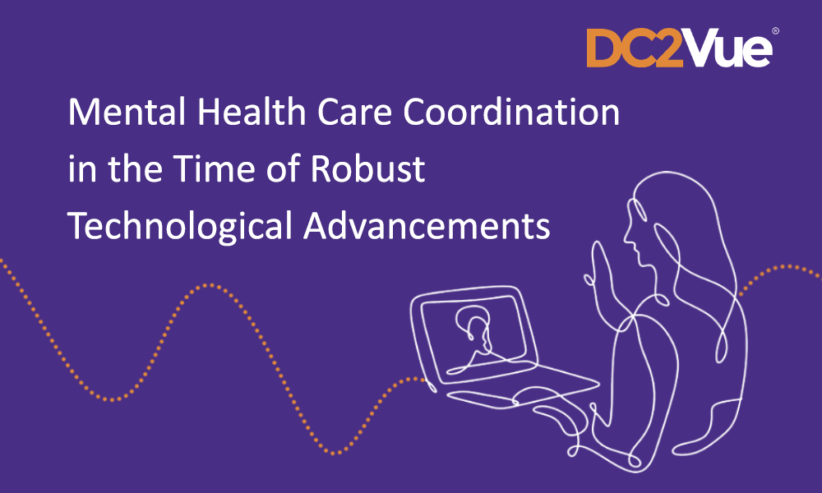(03) 9863 7644


Mental Health Care Coordination in the Time of Robust Technological Advancements
Digital mental health care coordination services are changing the way mental health services are accessed and delivered:
-
They decrease geographic barriers to help-seeking patients.
-
They allow for increased peer support in the delivery of mental health services.
-
They allow for digital triage, referral processes, mental health EMR.
-
They have the potential to be scaled up cost-effectively.
Granted, the evidence on the successful implementation and integration of mental health software within the broader mental health system and healthcare sector is still developing. However, digital mental health care coordination services and mental health EMR will play an essential role in meeting the growing demand for overall mental health services.
With a digital mental health services ecosystem comes new barriers and opportunities that must be overcome and utilized to their fullest. The primary barriers and opportunities revolve around:
Demand for Digital Mental Health Care Coordination Services
: Digital inclusion and adoption of mental health software services, considerations for vulnerable cohorts, and the use of lived experience in service design and delivery are all points of concern in the first key barrier.Supply of Digital Mental Health Software Services
: The mental health and lived experience workforce, the integration of digital mental health services with the broader mental health system (such as the application and implementation of mental health EMR), mental health software, mental health platforms, and data and assessment are all part of this crucial barrier.Funding and Regulation of Digital Mental Health Care Coordination Services
: The current financial structures between nations and existing legal and regulatory frameworks are part of this barrier.
Opportunities and Barriers in the Development of Digital Mental Health Services
Although there are barriers to the smooth implementation of mental health care coordination, there is also room for opportunities to work through or around them.
Demand for Digital Mental Health Care Coordination Services
If people who most need healthcare are the least likely to have access to digital options, providing digital services, such as mental health software and mental health EMR, may increase health disparities. Furthermore, reservations about data privacy and confidentiality and the effectiveness of digital mental health services continue to influence how much people utilize them.
You should consider the following opportunities to overcome the barriers surrounding the demand for digital mental health care coordination:
Improve consumer and lived experience perspectives in the design and delivery of digital mental health services to increase community trust and knowledge and ensure digital services are personalized and person-centred, such as increased advocacy for peer support roles.
Engage digital mental health advocates to promote awareness and help people navigate the digital mental health software system, particularly disadvantaged groups.
Determine the potential for providing appropriate access to digital tools and platforms for people most likely to experience digital exclusion. This determination includes giving an internet-access room in general practice, providing Data Sims cards, or providing low-cost public internet for those who do not have access to the internet.
Supply of Digital Mental Health Software Services
With recent advancements in digital mental health care coordination, training and education, for example, mental health advocacy groups training programs and resources and health practitioners understanding of digital mental health services have grown over time. However, there are still some gaps in health practitioner confidence in using digital tools and technology and awareness of the wide range of digital mental health services available, their purpose, and the cohorts they are designed to serve.
Furthermore, health practitioners want some transparency about the efficacy of treatments and the visibility of clients who get referred to them.
You should consider the following opportunities to overcome the barriers surrounding the supply of digital mental health software services:
Provide basic mental health training to all practitioners: especially those who work in regional, remote, or crisis-affected communities. Provide specialized training to raise awareness of and confidence in using digital mental health services with patients, including options for trauma-informed care and culturally appropriate practice. Because one size does not fit all, developing a consistent education and training program with regionally relevant and created reskilling would be required.
To enhance health practitioner awareness and understanding of digital mental health tools and technologies, develop easy-to-find decision-support tools and materials. This service includes teaching and training on using tools and technologies to improve competency, triage and diagnostic tools to aid evaluation and referral, and education and training on using blended digital and face-to-face care models.
Communicate digital mental health training, development, and certification pathways for non-professional practitioners, such as peer-support workers, care navigators, and the lived experience workforce, to effectively equip them with the skills and knowledge to use mental health software and platforms.
Funding and Regulation of Digital Mental Health Care Coordination Services
Mental health services, including digital mental health, are administered through a complicated, often fragmented system, with numerous providers received from the federal and state governments. Thus, you will hamper consumers’ capacity to obtain linked and person-centred care across the care continuum without enhanced co-design, planning, and communication between all levels of government.
You should consider the following opportunities to overcome the barriers surrounding the funding and regulation of digital Mental Health Care Coordination Services:
Achieve better-coordinated funding for digital mental health services, emphasizing the importance of clearly defined roles and duties, as well as a convergence of jurisdictional interests.
Examine funding possibilities, such as packaged funding for multidisciplinary and blended care models and shared value partnerships, to achieve desired system-level outcomes.
Examine financing for enabling and operational activities, such as education, training, awareness, and culturally appropriate and trauma-informed treatment, that support digital mental health service delivery and continuity of care.
Conclusion
The accessibility of technology is changing the way mental health services get provided. By overcoming geographic, stigma, privacy, and financial constraints, digital mental health care coordination systems can increase efficiency and consumer access to services.
However, technological advancement is not enough. When governments, experts, and advocates work together to bring mental health services to the common people, only then will true mental health care coordination will live up to its potential.





